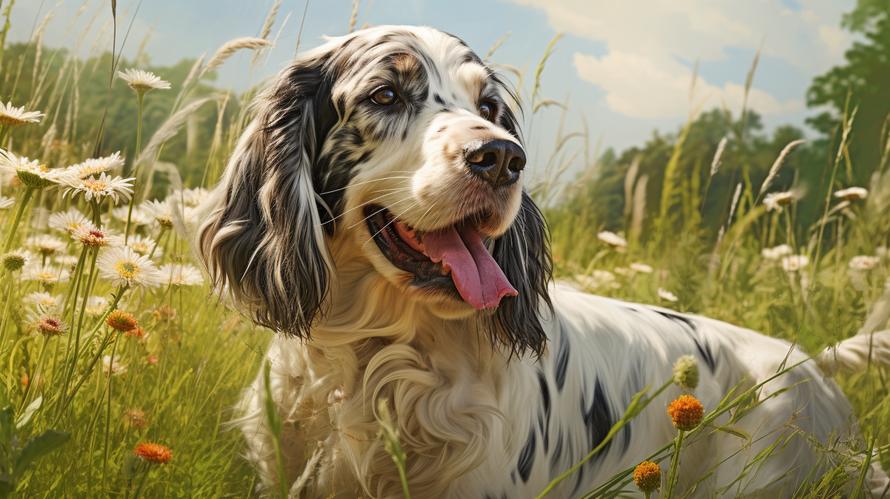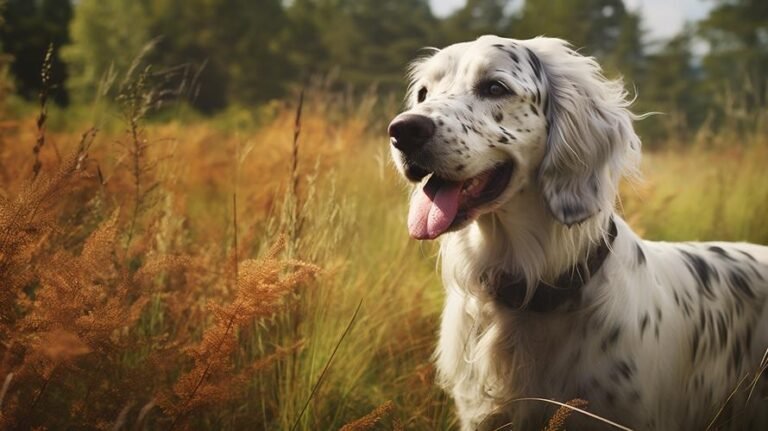Did you know what James I of England and French artist Alexandre-François Desportes had in common? They both found companions in English Setters, an affectionate, playful breed with a seemingly ageless knack for hunting.
However, despite their lineage, these gentle-hunting dogs often come under a surprising question – Can an English Setter also be a good guard dog? This may seem like an odd question as English Setters are naturally friendly and have peacefully cohabited with humans for centuries. So, let’s take an adventure into the world of English Setters to uncover more about their personalities, traits and potential for being good guard dogs.
It’s no secret that English Setters are not on any lists of top guard dog breeds. We normally hear about German Shepherds, Rottweilers, and Dobermans, known for their protective characteristics, filling these roles. That said, it would be unwise to completely dismiss the English Setter’s abilities without first understanding them.
Dogs became man’s best friend thousands of years ago and each breed evolved with humanity to fulfill different roles. English Setters were bred for their keen scenting skills to “set” or indicate the position of game birds. It’s safe to say that their protective instincts were not the primary skill breeders focused on while developing this breed, but does that mean they can’t be good guard dogs? The answer isn’t as straightforward as it seems.
To understand a breed’s potential effectiveness as a guard dog, we need to consider several characteristics like size, strength, temperament, trainability, and instinctual protective behaviors. When it comes to English Setters, they aren’t giant dogs, but an adult male can reach a respectable height of up to 27 inches and weigh around 65 pounds – providing a bit of a deterrent to intruders.
With their characteristic long feathered coat, they might not radiate the fierce aura that a Rottweiler does, but size is just one factor. Let’s delve into their temperament and inherent traits.
English Setters are known for their endurance, intelligence, and friendly demeanor. They are gentle, congenial dogs who are good with children and typically friendly towards strangers. This means that although they could raise an alarm when someone approaches your property, they probably won’t display aggressive behaviors. If your expectation of a guard dog is one who possesses a bit of a territorial or aggressive streak – then an English Setter alone may not fit the bill.
Furthermore, like we already mentioned, English Setters were bred for hunting. They simply love to chase anything that moves which is why they do remarkably well at agility and obedience exercises. However, their instinct to chase can sometimes kick in at the wrong moment which makes them less reliable as guard dogs.
It’s essential to have a clear understanding of what you want from your dog. If your aim is to have a dog that can physically protect your house, an English Setter may not be the best choice. But if your requirement is a dog that will alert you of unfamiliar faces or unusual occurrences, then an English Setter could very well be trained to do just that.
Also, training plays a pivotal role in utilizing potential guard dog traits in your pet. English Setters, with their inherent intelligence, can be quite easy to train. Early socialization and obedience training can help harness their alertness towards strangers and unusual occurrences.
Moreover, while they’re not inherently guard dogs, English Setters possess certain qualities that make them excellent companions – they’re highly loyal, friendly and interactive, and can be a source of cheerful energy in your household.
In conclusion, while English Setters may not meet the conventional expectations of a guard dog, they’re incredibly loyal companions and, with the right training, can serve as excellent watchdogs. Remember, each dog is unique and it’s important to understand and respect their individual temperaments and traits. If you have an English Setter, don’t try to mold them into something they’re not. Instead, cultivate their strengths and you’ll have a loving, loyal friend for life.



